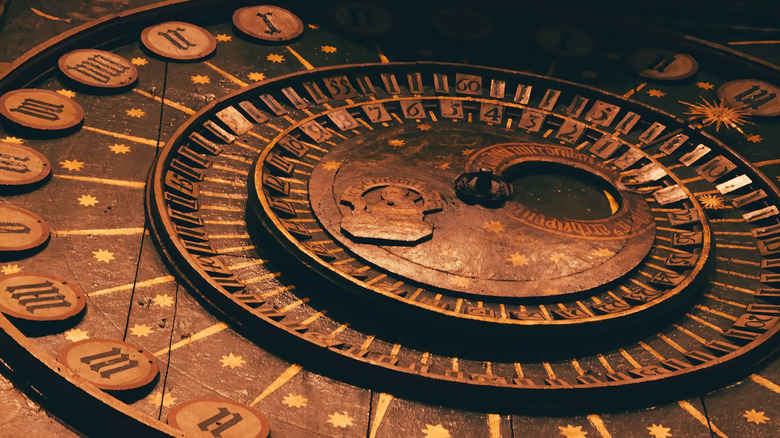Why The Past, Present, And Future May Exist All At Once
In sci-fi circles, talk of "time" instantly leads to one thing: time travel. Travel back to the past to change the future? Whoops, just made the future happen ("Time's Arrow," "Star Trek: TNG," 1992). Travel back to the past to create a divergent, new future that, paradoxically, would mean you didn't go back into the past to begin with? ("The Terminator," 1985). Travel back to the past to patch it up and ensure the future happens unchanged ("Back to the Future," also 1985)? Or, you know, just combine all three like in "Avengers: Endgame" (2019).
Time travel, and discussions of time in general, invariably center on three things: paradoxes, determinism, and free will. Film writers assume — perhaps correctly — that folks are dissatisfied with their lives and wish for a reset button somewhere in the past. You'd have been a professional NBA player if only you made that one three-pointer in JV basketball in seventh grade.
In physics, time is more complex. We experience things "now," and assume that the past is done and the future has yet to happen. But depending on speed and location (via Einstein's Theory of General Relativity, discussed on Quanta Magazine), your future can be someone else's past. Additionally, classical (non-quantum) physics is deterministic. Meaning, with enough data on particles in the universe, all things are predictable, whether "chosen" or not, as The Guardian outlines.
Stuck in a slice of time cheese
One way to describe all this is the "Block Universe," as Interesting Engineering explains. And just like a block of your favorite gouda, you can slice it into thin wafers of "now." Tuck yourself into a wafer, and move forward through the block's length. Or pass your consciousness from wafer to wafer. Or eat a slice and grab a box of saltines.
The point is that the Block Universe, or "Eternalism," as its sometimes called, posits that time is an illusion suffered by the mind. All things that do, have, and will exist do exist in a single, unmoving slab of eternal existence that we only happen to experience moving in one direction: "forward." This notion, explained by Dr. Kristie Miller further on ABC News, stands in opposite to "Presentism," the traditional belief that our linear, subjective experience of "now" is the only, single moment that exists.
Of course, we know the latter isn't true simply by looking up at the night sky. Stars are just too far away for us to perceive except by seeing their past; light from distant galaxies takes billions of years to reach us. Does this mean if we could somehow instantly shift to a distant star's location, we could experience it's own now "now"? You see the problem. Depending on time and space (space-time, as it's called), "now" is relative. And as Eternalism posits, all things that do, have, and will exist do exist. Simultaneously.
The past is the future is the present
You could get nit-picky about this whole "time and space are relative, and therefore reality is a mere illusion" thing. For instance, a pragmatist could say, "What does it matter if my past exists now? I can only experience the present." Or, "What does it matter if my future exists now? I still chose it." Yes, both are true.
On top of this, time travel really is possible, as Dr. Kristie Miller says on ABC News. But not in the way you'd think. You can't go back in time by stepping into a flashy-spinny gyroscopic machine to "change the past." Moving through time requires moving through space. If you moved through time, you would, in fact, just be moving through space in a way that bypassed the speed of light. In the end, you'd be merely fulfilling your role in the future by taking commensurate action in the past. You'd change nothing. Or as Dr. Miller says, "When I eat cornflakes instead of toast tomorrow I am not changing the future, I'm just making the future the way it is." At this point, feel free to take a deep breath.
Overall, if we live in a Block Universe, then that means that time doesn't "pass" at all. Entities who could somehow behold dimensions one through three (space), and also four (time), would perceive an unmoving slab like uncut cheese.
Why no re-forming eggs?
The Block Universe has its doubters, of course. As Quanta Magazine says, critics point out that the Block Universe "theory" is more of a mental construct. It's a handy way to conceive of how we perceive reality, not some kind of true physical description. After all, how could it be quantified? Physicist Avshalom Elitzur went so far as to say, "I'm sick and tired of this block universe," continuing, "I don't think that next Thursday has the same footing as this Thursday. The future does not exist. It does not! Ontologically, it's not there." In 2016, a whole bunch of researchers — 60, in fact — got together at the Perimeter Institute for Theoretical Physics in Waterloo, Canada, to discuss these kinds of problems.
One big, glaring issue with the notion of time as a single, frozen chunk is directionality, which Foundalis explains. There's no apparent cosmic "rule" or reason why we don't experience time both backwards and forwards. Why do we only "remember" the past, if all of reality exists all at once? No one has any clue. We should, like Christopher Nolan's "Tenet" (2020), see cracked eggs re-forming as often as we see them breaking and splatting.
Of course, the old axiom rings true: The absence of evidence is not the evidence of absence. Just because we can't explain something doesn't mean it isn't true. And to borrow from another adage: Only time will tell ... about time.



